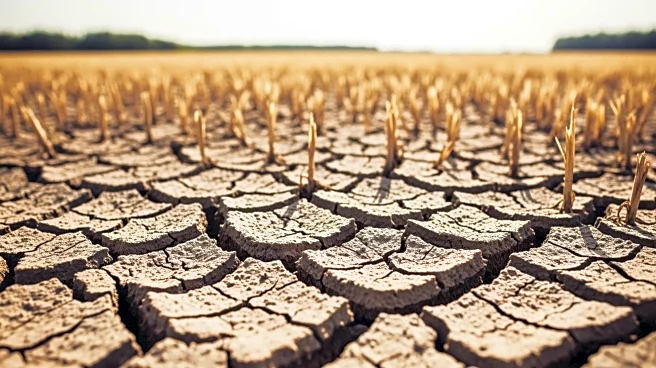What's Happening?
A report by the Food and Agriculture Organization (FAO) reveals that disasters have caused $3.26 trillion in agricultural losses globally over the past 33 years. These losses, averaging $99 billion annually,
account for roughly 4% of global agricultural GDP. The report highlights the impact of various disasters, including droughts, floods, and pests, on food production and security. It also emphasizes the role of digital technologies in transforming agrifood systems from reactive crisis management to proactive resilience-building. Digital innovations are enabling better risk monitoring, early warnings, and decision-making support for farmers, helping to mitigate the impact of disasters on agriculture.
Why It's Important?
The significant financial losses in agriculture due to disasters underscore the vulnerability of global food systems to climate-related events. The FAO's report highlights the need for improved disaster risk management and the potential of digital technologies to enhance resilience. By adopting data-driven approaches, farmers and policymakers can better anticipate and respond to disasters, reducing their impact on food security and rural livelihoods. The report also calls for increased investment in digital infrastructure and capacity development to ensure that these technologies reach vulnerable communities, particularly smallholder farmers who are most affected by disasters.
What's Next?
The FAO's findings may prompt governments and international organizations to prioritize investments in digital technologies for disaster risk reduction in agriculture. This could involve expanding access to digital tools and platforms that provide real-time insights and early warnings. The report also suggests integrating these technologies into national agricultural policies and strategies to enhance their effectiveness. As digital solutions continue to evolve, they may play a crucial role in building more resilient agrifood systems and protecting food security in the face of increasing climate-related challenges.
Beyond the Headlines
The report's emphasis on digital transformation in agriculture highlights the potential for technology to drive systemic change in food systems. By leveraging digital tools, farmers can improve productivity and sustainability, contributing to global efforts to combat climate change. The focus on digital inclusion also raises important questions about equity and access, as many rural communities remain offline and unable to benefit from these innovations. Addressing these disparities will be critical to ensuring that digital technologies contribute to more inclusive and resilient food systems.









